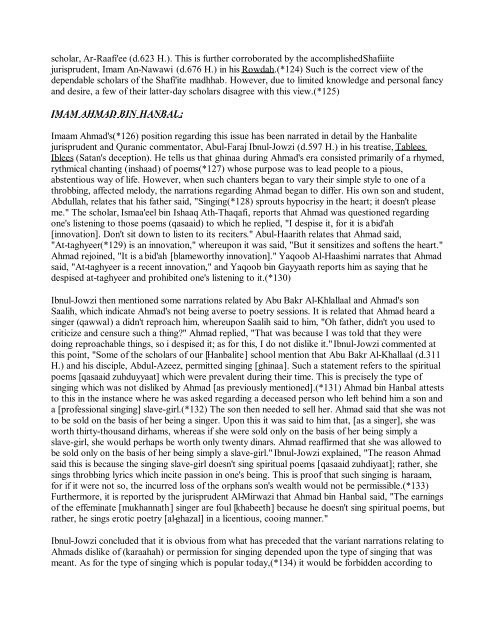The Islamic Ruling on Music and Singing - Enjoy Islam
The Islamic Ruling on Music and Singing - Enjoy Islam
The Islamic Ruling on Music and Singing - Enjoy Islam
Create successful ePaper yourself
Turn your PDF publications into a flip-book with our unique Google optimized e-Paper software.
scholar, Ar-Raafi'ee (d.623 H.). This is further corroborated by the accomplished Shafiiite<br />
jurisprudent, Imam An-Nawawi (d.676 H.) in his Rowdah.(*124) Such is the correct view of the<br />
dependable scholars of the Shafi'ite madhhab. However, due to limited knowledge <strong>and</strong> pers<strong>on</strong>al fancy<br />
<strong>and</strong> desire, a few of their latter-day scholars disagree with this view.(*125)<br />
IMAM AHMAD BIN HANBAL:<br />
Imaam Ahmad's(*126) positi<strong>on</strong> regarding this issue has been narrated in detail by the Hanbalite<br />
jurisprudent <strong>and</strong> Quranic commentator, Abul-Faraj Ibnul-Jowzi (d.597 H.) in his treatise, Tablees<br />
Iblees (Satan's decepti<strong>on</strong>). He tells us that ghinaa during Ahmad's era c<strong>on</strong>sisted primarily of a rhymed,<br />
rythmical chanting (inshaad) of poems(*127) whose purpose was to lead people to a pious,<br />
abstentious way of life. However, when such chanters began to vary their simple style to <strong>on</strong>e of a<br />
throbbing, affected melody, the narrati<strong>on</strong>s regarding Ahmad began to differ. His own s<strong>on</strong> <strong>and</strong> student,<br />
Abdullah, relates that his father said, "<strong>Singing</strong>(*128) sprouts hypocrisy in the heart; it doesn't please<br />
me." <str<strong>on</strong>g>The</str<strong>on</strong>g> scholar, Ismaa'eel bin Ishaaq Ath-Thaqafi, reports that Ahmad was questi<strong>on</strong>ed regarding<br />
<strong>on</strong>e's listening to those poems (qasaaid) to which he replied, "I despise it, for it is a bid'ah<br />
[innovati<strong>on</strong>]. D<strong>on</strong>'t sit down to listen to its reciters." Abul-Haarith relates that Ahmad said,<br />
"At-taghyeer(*129) is an innovati<strong>on</strong>," whereup<strong>on</strong> it was said, "But it sensitizes <strong>and</strong> softens the heart."<br />
Ahmad rejoined, "It is a bid'ah [blameworthy innovati<strong>on</strong>]." Yaqoob Al-Haashimi narrates that Ahmad<br />
said, "At-taghyeer is a recent innovati<strong>on</strong>," <strong>and</strong> Yaqoob bin Gayyaath reports him as saying that he<br />
despised at-taghyeer <strong>and</strong> prohibited <strong>on</strong>e's listening to it.(*130)<br />
Ibnul-Jowzi then menti<strong>on</strong>ed some narrati<strong>on</strong>s related by Abu Bakr Al-Khlallaal <strong>and</strong> Ahmad's s<strong>on</strong><br />
Saalih, which indicate Ahmad's not being averse to poetry sessi<strong>on</strong>s. It is related that Ahmad heard a<br />
singer (qawwal) a didn't reproach him, whereup<strong>on</strong> Saalih said to him, "Oh father, didn't you used to<br />
criticize <strong>and</strong> censure such a thing" Ahmad replied, "That was because I was told that they were<br />
doing reproachable things, so i despised it; as for this, I do not dislike it." Ibnul-Jowzi commented at<br />
this point, "Some of the scholars of our [Hanbalite] school menti<strong>on</strong> that Abu Bakr Al-Khallaal (d.311<br />
H.) <strong>and</strong> his disciple, Abdul-Azeez, permitted singing [ghinaa]. Such a statement refers to the spiritual<br />
poems [qasaaid zuhduyyaat] which were prevalent during their time. This is precisely the type of<br />
singing which was not disliked by Ahmad [as previously menti<strong>on</strong>ed].(*131) Ahmad bin Hanbal attests<br />
to this in the instance where he was asked regarding a deceased pers<strong>on</strong> who left behind him a s<strong>on</strong> <strong>and</strong><br />
a [professi<strong>on</strong>al singing] slave-girl.(*132) <str<strong>on</strong>g>The</str<strong>on</strong>g> s<strong>on</strong> then needed to sell her. Ahmad said that she was not<br />
to be sold <strong>on</strong> the basis of her being a singer. Up<strong>on</strong> this it was said to him that, [as a singer], she was<br />
worth thirty-thous<strong>and</strong> dirhams, whereas if she were sold <strong>on</strong>ly <strong>on</strong> the basis of her being simply a<br />
slave-girl, she would perhaps be worth <strong>on</strong>ly twenty dinars. Ahmad reaffirmed that she was allowed to<br />
be sold <strong>on</strong>ly <strong>on</strong> the basis of her being simply a slave-girl." Ibnul-Jowzi explained, "<str<strong>on</strong>g>The</str<strong>on</strong>g> reas<strong>on</strong> Ahmad<br />
said this is because the singing slave-girl doesn't sing spiritual poems [qasaaid zuhdiyaat]; rather, she<br />
sings throbbing lyrics which incite passi<strong>on</strong> in <strong>on</strong>e's being. This is proof that such singing is haraam,<br />
for if it were not so, the incurred loss of the orphans s<strong>on</strong>'s wealth would not be permissible.(*133)<br />
Furthermore, it is reported by the jurisprudent Al-Mirwazi that Ahmad bin Hanbal said, "<str<strong>on</strong>g>The</str<strong>on</strong>g> earnings<br />
of the effeminate [mukhannath] singer are foul [khabeeth] because he doesn't sing spiritual poems, but<br />
rather, he sings erotic poetry [al-ghazal] in a licentious, cooing manner."<br />
Ibnul-Jowzi c<strong>on</strong>cluded that it is obvious from what has preceded that the variant narrati<strong>on</strong>s relating to<br />
Ahmads dislike of (karaahah) or permissi<strong>on</strong> for singing depended up<strong>on</strong> the type of singing that was<br />
meant. As for the type of singing which is popular today,(*134) it would be forbidden according to

















